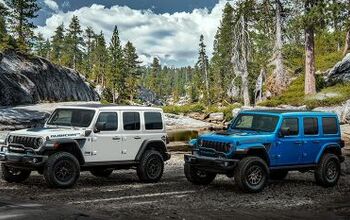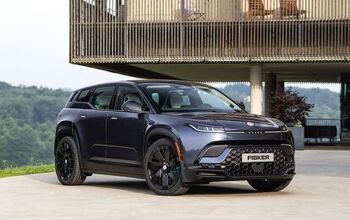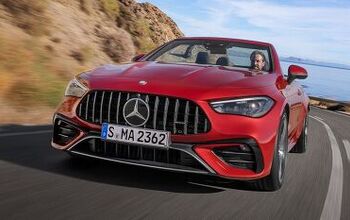V8 Death: Edmunds Gets It Half Right
Edmunds' Inside Line (EIL) is reporting that fewer and fewer consumers are opting for V8 engines. True dat. Despite gains in efficiency and weight, less folks aren't flocking to the fat lady. EIL blames the V8's lower fuel economy. The other, unexplored reason: four and six cylinder engines are larger in displacement than they were ten or fifteen years ago, and they're cranking out levels of power formerly reserved for V8s. (The gearbox revolution– that's taken everybody from four-speed autos to five, six, seven, eight or infinite gears– has certainly helped.) The numbers tell the tale: the 1998 Mercedes E320 had a 3.2-liter engine with 215 horsepower. The larger alternative: a 4.3-liter V8 with 275 horses. For the upcoming model year, the E350 will have 3.5-liters offering a whopping 300+ horsepower. The "our six now makes more than the V8 of a decade ago" philosophy also applies at BMW (305 hp I6 vs. 282 hp V8), Infiniti (330 hp V6 vs. 266 hp V8), GM (304 hp V6, 290 hp I6 vs. 250 hp V8s), and pretty much everyone else. Let's face it: in cars weighing between 3000 to 4000 lbs, the common folks don't have much use for engines with more than about 300 horsepower. Why would they pay to upgrade to a V8 when basic acceleration is so good? Why indeed.


































Comments
Join the conversation
Another factor is the same legacy reputation that hurts the Detroit 2.8. A lot of Americans associate V8's with the POS land barges of yesterday. They also compare these Detroit monsters to the German and Japanese cars. They seem to be just wonderful with only 4,5, or 6 cyl motors. So one comes to the conclusion that V8's are for gas guzzling land barges of yesteryear.
I opted for the 6 cylinder version of the Land Cruiser, so you know where I stand. Still, if I were buying American, I would go with the eight. No scientific data on that, just a feeling that the folks in Detroit make better 8's than anything else they try.
Having driven the new CTS I will dispute the claim that the acceleration is "good", it's adequate but not what you expect for the type of car. You have to cane that V6 to get acceptable performance from it and it doesn't sound great when revved. Many other big V6 cars behave the same way. The irony of V6s motivating heavy vehicles and putting out that much power is that they use nearly as much fuel as a V8 engine without providing the same performance. Let's take the Pontiac G8 for example. The V6 G8 is rated at 25MPG freeway. The V8 G8 is rated at 24MPG freeway. You also get nearly 100 more horses, much more torque, an engine that sounds so much better, and a car that drives so much better. What besides money to buy the car initially are you saving by getting the V6 model?
For simonptn: here's the wikipedia entry on the Honda, complete with weight, power, engine size, transmission information for every year. http://en.wikipedia.org/wiki/Honda_Accord To summarize-- 1976 Accord: 2000 pounds, 68 HP, 2-speed automatic. 1982 Accord: ???? pounds, 75 HP, 3-speed automatic. 1983 Accord: gain 4-speed automatic 1984 Accord: 86 HP 1985 SE-i version: 110 HP (i = fuel injection) 1990 Accord: 125-130 HP from a 2.2L 16-valve 1994 Accord: 145 HP 1995 Accord: optional V6 2.7L 1998 Accord: 2.3L with 130 HP or 150HP: 3.0L 200 HP 2006: V6 engine is quoted at 244 HP and I4 is 166.